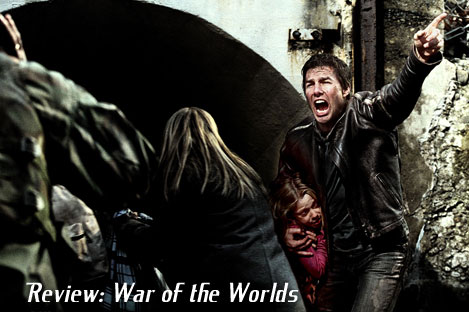
War of the Worlds
Summer just wouldn’t be summer without big budget summer movies! They’re where we go to get out of the heat for a little while, watch stuff get blowed up real good, and, of course, learn important lessons about the true meaning of family from the moral and spiritual leaders of our society: Hollywood screenwriters. You’d be hard-pressed to find a more representative example of the big summer movie this season than War of the Worlds. It’s massive and loud, with tons of special effects and a death toll that’s somewhere in the millions. Fortunately, it’s also skillfully made and has a bit more on its mind than simply delivering explosive entertainment.
There are some big ideas buried under the surface of Steven Spielberg’s War of the Worlds. (There are other big things under the surface, too.) The scenes of destruction in the film are the most sustained, thrilling use of special effects seen in a summer movie in quite some time. They’re also the most purposeful. It’s clear that Spielberg was operating on a post-September-11th level here, and in this film he is brilliant at composing images that are suggestive of not only the destruction of that day, but of the sense of loss that accompanied it as well. Like some of that day’s victims, many people in the film are reduced to ash, simply disappearing, as if they were never there at all, and in one of the film’s most poignant images, empty clothes rain out of the sky.
Like many sci-fi movies of the 1950s, there’s political meaning here in the alien invasion and the ways in which people respond to it. H.G. Wells’ 1898 novel has often been viewed as a commentary on British imperialism, and the new film certainly can be interpreted as a commentary on current American foreign policy. In a very effective supporting role, one of our most politically outspoken actors gives voice to a particular outlook on the alien invasion and on invasions in general (“Occupations always fail.”), and the son in the movie’s central family, like many young Americans after September 11th, seems hell-bent on delivering payback to the attackers.
Unfortunately, the humanity of that central family, and plenty of other, more minor characters, gets a bit lost amid the film’s other concerns. Not content with making Tom Cruise’s Ray Ferrier a true Everyman sort, the film plays to the actor’s larger than life persona and makes him a kind of SuperEveryman. (Speaking of that persona, I give mad props to Tom Cruise for stepping up to the plate in recent weeks to fill the big Crazy Celebrity vacuum left by Wacko Jacko’s departure from the media spotlight!) Only Ferrier can move forty containers in an hour at his Everyman job at the docks! Only he knows how to fix cars in the event of an alien invasion! Only he notices vital weaknesses in the invaders’ defenses! But of course, there’s one thing even SuperEveryman can’t do, and that’s connect with his kids. Spielberg is masterful at grounding the film’s events in the real world through naturalistic lighting and handheld camera work, but turning Cruise into a rather implausible hero instead of just an ordinary guy and concerned father undermines this sense of reality. There are other frequent, implausible moments that stretch our suspension of disbelief past the breaking point, too. (How could the mechanic have been that clueless about what was going on?)
Fathers and father figures are a recurring motif in Spielberg’s films, from the strained relationship between the Jones boys in Indy 3 to Jurassic Park’s Dr. Grant going from kid-hating curmudgeon to concerned daddy-type faster than you can say Tyrannosaurus rex. In War of the Worlds, there’s tension between Ray and his son Robbie, but it resolves itself in such an empty and meaningless way that the whole thing ends up feeling superfluous. There’s the occasional genuinely affecting moment, such as Ferrier’s sweet lullaby to his daughter in a brief moment of reprieve from the destruction, but these moments are just too few to let us become very invested in these characters as real people. Spielberg, through his skillful use of faces in horror as they regard the devastation, or faces in anguish for a fleeting moment before they’re vaporized into nothingness, nonetheless keeps things rooted in a sense of human emotion and human cost, and no face is more valuable in this regard than that of the almost eerily good Dakota Fanning. Still, this success is in spite of the screenplay’s underdeveloped attempts to put family matters at the heart of the film, not because of them. Ultimately, it’s the way the film resonates so deeply and sincerely with some of the largest, most global concerns of the moment that makes it stay with us. And that it sure is fun watching things get destroyed.
B+
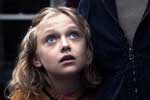
- War of the Worlds
- by Carolyn Petit
- Published on August 1st, 2005
- Movie:
- War of the Worlds
- Director:
- Steven Spielberg
- Cast:
- Tom Cruise, Dakota Fanning, Miranda Otto, Justin Chatwin, and Tim Robbins.
- Rating:
- B+
More from Carolyn Petit:
-
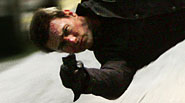
Mission Impossible 3
…there’s plenty of generic but very engaging spy action in Mission: Impossible III. And Shanghai looks amazing.
-

War of the Worlds
It’s clear that Spielberg was operating on a post-September-11th level here, and in this film he is brilliant at composing images that are suggestive of not only the destruction of that day..
-
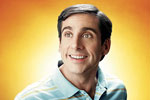
The 40 Year old Virgin
Andy Stitzer, played brilliantly by Steve Carell, the movie gives us a guy who has understandable reasons for ending up where he is; a sweet, charming, funny, vaguely sad guy we can’t help but root for.
-
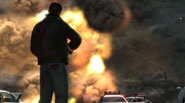
GTA IV: Rockstar’s series grows up a bit
This is not the immoral or amoral story some people loudly accuse it of being. On the contrary. Like all good crime fiction, it is a deeply moral story, a story of choices and consequences. The plot moves at a slower, more deliberate pace than those of the other GTA games..
-
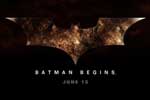
Batman Begins
Do we really have any free will, or do we just act out the byproducts of the genetic code we’ve inherited as it’s filtered through a lens of childhood traumas and incoming stimuli?
Other recent features:
-

Sónar 2010 – Barcelona, Spain
The festival attracts a lot of outsiders, but the Mediterranean, Spanish and more specifically Catalan nature of the people makes the festival what it is. Catalan people are passionate and this passion is infectious. The atmosphere is electric in Barcelona as a city and heightened by music and intoxicants at Sónar.
-

Summer Party Naval Styles at Seven RestoLounge
Oysters, like wine are affected by terroir and these Miyagi’s flavor profiles ranged with one showing a cleaner, almost tropical profile and the other being more salty, marine driven. As I was devouring the seemingly endless plates put in front of us, I sipped on a glass of fine sauvignon blanc.
-

R4NT Radio March 2010
R4NT Radio March 2010 um wow it’s been far too long since the last edition edition, featuring: Hector Hernandez, The Infesticons, Blockhead, Gramatik, Emika, Thunderheist, Parov Stelar, Eddy Meets Yannah, Anti-Pop Consortium, The Slew, Lighterthief, Andreya Triana, Parasyte Woman, Mathon, Venetian Snares, and Funki Porcini.
-

O Restaurant & Lounge revisited
Calgary has a diverse set of urban communities, most of which have the ubiquitous strip mall watering hole. In the South West community of Marda Loop, a reinvention of this paradigm has been established.
-

Predictions 2010.. and beyond!
So 2010 eh? Almost but not quite (no year zero they say) another decade? It seems like just yesterday that the world was waiting for Y2K. R4NT started publishing in March 2001, so we’re not quite 10 years old yet, but in internet years we are already a senior citizen.
-

Invictus
No matter what, the reality of Nelson Mandela is something that deserves screen time. Should this film even remotely intrigue the masses to take interest in this figure, the world would likely benefit greatly from it.

